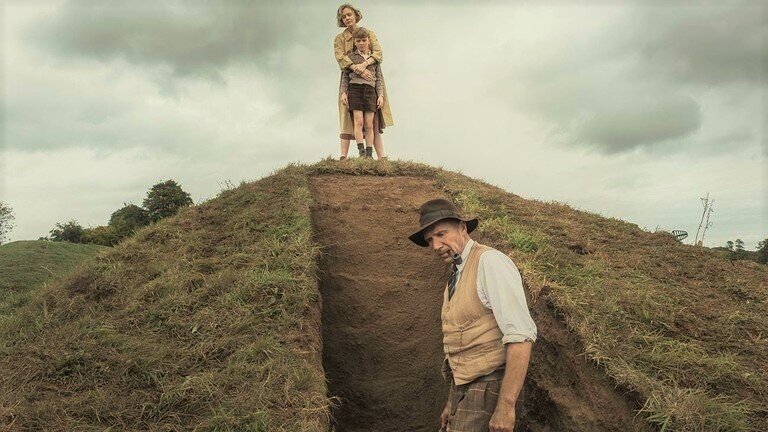The Dig
Talented British actors show that they can be relied on to save the day.
We have here a prime example of how a very talented cast can enhance a film that could easily have been a total write-off. Since period tales set in this country are often extremely popular, it may well have seemed a good idea to build a film around the 1939 excavations at Sutton Hoo near Woodbridge in Suffolk. Certainly the discovery there of a burial ship from the 7th century was a remarkable event, but digging in the ground however splendid the ultimate outcome is hardly the stuff of drama that readily fills out a full feature film. It does help that behind these events lay another story, that of a self-taught Suffolk archaeologist named Basil Brown. Edith Pretty, a colonel's widow and the owner of the land in question, asked Brown to begin excavating and, although his work was crucial to the endeavour, control of it was taken over by Charles Phillips an archaeologist from the University of Cambridge. Although Brown's contributions would nevertheless continue, the take-over would result in his role being understated in the record books. What this does for the film is to provide an extra drama, the story of an heroic little man undertaking a just fight not to be overwhelmed by more influential men eager to claim all the credit for themselves.
A female archaeologist name Peggy Piggott was also among those involved in the work and Moira Buffini's screenplay draws on a 2007 historical novel written by Piggott's grandson John Preston constructed around the excavation. While the key figures encountered in this film all existed, it could well be that fictional elements have been added, not least a romantic sub-plot involving Peggy. A plane crash in the area is positively milked for drama too in the way that it is shot. But, if some of this suggests an attempt to fill out the material to feature length (The Dig lasts 112 minutes), what proves calamitous for the film is the approach taken by its Australian director Simon Stone. For one thing he obtains from Stefan Gregory the kind of music score that is relentlessly poured over most of the film (what a relief it is when one finds a scene without this accompaniment). But what irritates no less in a story that calls out for a basically realistic tone is Stone's eccentric direction. That applies particularly to his handling of dialogue. He not only likes to start dialogue from the next scene while the preceding one is still running and to feature shots in which the person seen is not the one heard talking but also enjoys filming a conversation between two characters when their backs are to the camera. Elsewhere intercutting becomes tiresome and there's even one exchange heard over a rural scene that is unpopulated!
Such distractions occur so frequently, especially in the film's first half, that it is only the quality of the acting that makes the film bearable. Basil Brown is played by Ralph Fiennes - he is at his very best treating this as a character role complete with local accent - and he is matched in this approach by Monica Dolan as his wife. Although the role of Edith Pretty is less rewarding, Carey Mulligan shines once again, while Lily James proves to be well cast as Peggy. With good support too from the likes of Johnny Flynn, Ben Chaplin and Ken Stott the players really do make a difference, but what Stone may see as clever devices to enliven a staid period piece only suggest a director trying to be too clever by half.
MANSEL STIMPSON
Cast: Carey Mulligan, Ralph Fiennes, Lily James, Johnny Flynn, Ben Chaplin, Ken Stott, Archie Barnes, Monica Dolan, Eamon Farren, Paul Ready, Peter McDonald, Arsher Ali, Joe Hurst, Eileen Davies, James Dryden, Ellie Piercy, Danny Webb.
Dir Simon Stone, Pro Carolyn Marks Blackwood, Murray Ferguson, Gabrielle Tana and Ellie Wood, Screenplay Moira Buffini, from the novel by John Preston, Ph Mike Eley, Pro Des Maria Djurkovic, Ed Jon Harris, Music Stefan Gregory, Costumes Alice Babidge, Dialect coaches Charlie Haylock and Jamie Matthewman.
Clerkenwell Films/Magnolia Mae Films/Netflix-Netflix.
112 mins. UK. 2021. Rel: 29 January 2021. Available on Netflix. Cert. 12A.


